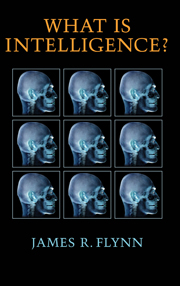Book contents
- Frontmatter
- Contents
- List of figures
- List of tables
- List of boxes
- Preface to the expanded paperback edition
- Acknowledgments
- 1 A bombshell in a letter box
- 2 Beyond the Flynn effect
- 3 Towards a new theory of intelligence
- 4 Testing the Dickens/Flynn model
- 5 Why did it take so long?
- 6 IQ gains can kill
- 7 What if the gains are over?
- 8 Knowing our ancestors
- 9 The art of writing cognitive history
- 10 About GUT: the grand unification theory of intelligence
- 11 Howard Gardner and the use of words
- Appendix I Tables
- Appendix II Declaration in a capital case
- References
- Subject index
- Name index
1 - A bombshell in a letter box
Published online by Cambridge University Press: 05 August 2012
- Frontmatter
- Contents
- List of figures
- List of tables
- List of boxes
- Preface to the expanded paperback edition
- Acknowledgments
- 1 A bombshell in a letter box
- 2 Beyond the Flynn effect
- 3 Towards a new theory of intelligence
- 4 Testing the Dickens/Flynn model
- 5 Why did it take so long?
- 6 IQ gains can kill
- 7 What if the gains are over?
- 8 Knowing our ancestors
- 9 The art of writing cognitive history
- 10 About GUT: the grand unification theory of intelligence
- 11 Howard Gardner and the use of words
- Appendix I Tables
- Appendix II Declaration in a capital case
- References
- Subject index
- Name index
Summary
The special function of scientific explanation is … to turn the unexpected, as far as possible, into the expected.
(Stephen Toulmin, Reason in ethics, p. 88)I am a teacher and rarely write for specialists alone. I have tried to avoid the dead-stick prose so beloved by journal editors. Anyone with a good education or a major in psychology should be able to read this book and the former is more important than the latter. It assumes that everyone is interested in intelligence and would like something exciting to provide a reason to learn more about it. Specialists will find that much has been omitted but will also, I hope, find something new in the argument and something worth pursuing in the research designs recommended.
A warning for everyone: there are problems that can simply be settled by evidence, for example, whether some swans are black. But there are deeper problems that pose paradoxes. Sometimes the evidence that would solve them lies in an inaccessible past. That means we have to retreat from the scientific level of explanation to the historical level where we demand only a plausibility that conforms to the known facts. I believe that my efforts to resolve the historical paradoxes we will discuss should be judged by whether someone has a more satisfactory resolution to offer. The reader should be wary throughout to distinguish the contentions I evidence from the contentions to which I lend only plausibility.
Information
- Type
- Chapter
- Information
- What Is Intelligence?Beyond the Flynn Effect, pp. 1 - 3Publisher: Cambridge University PressPrint publication year: 2007
